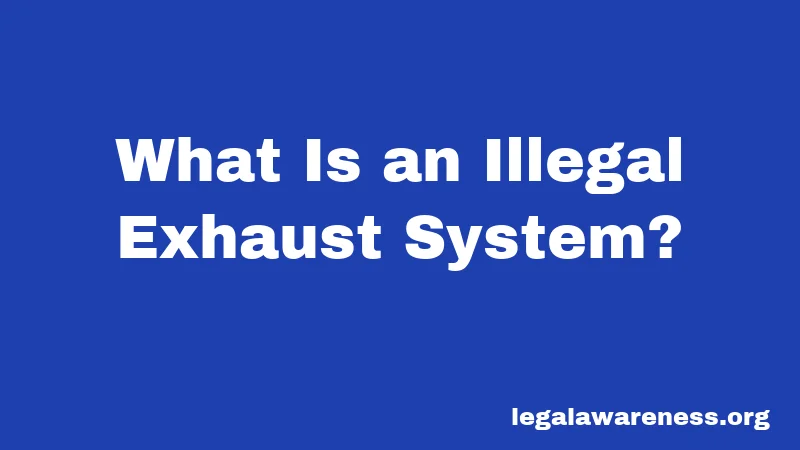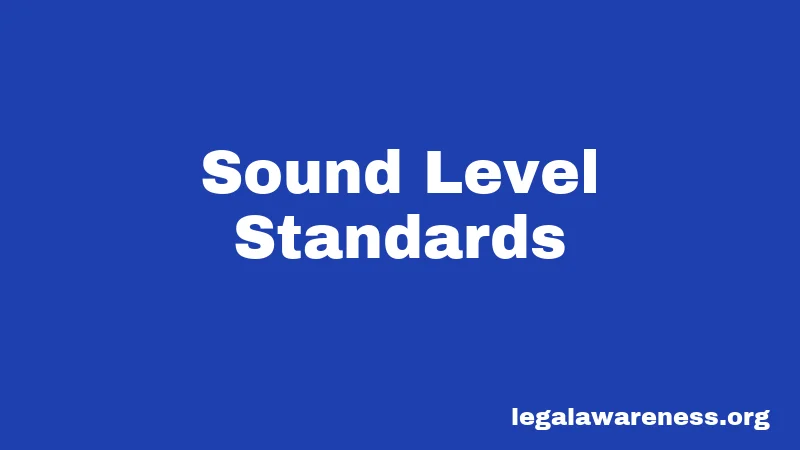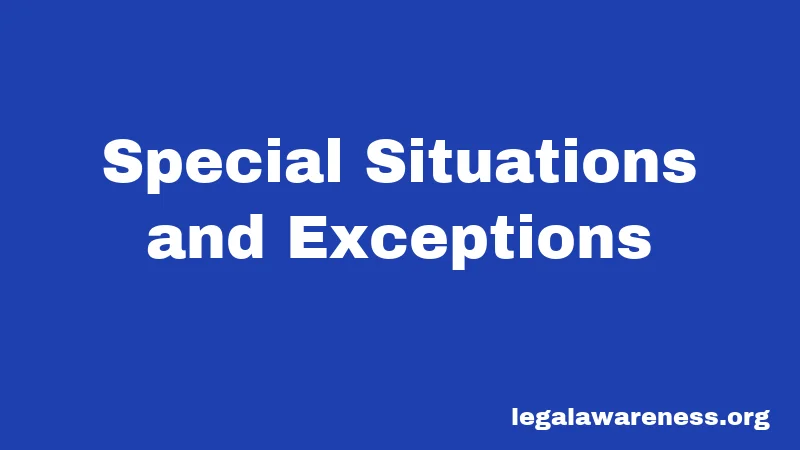Illinois Exhaust Laws in 2026: What Loud Mufflers Could Cost You
Most people have no idea that their car’s exhaust could be illegal. Seriously. But in Illinois, exhaust laws are strict, and the penalties can hit pretty hard. Let’s break down exactly what you need to know.
Whether you drive a beat-up Honda or a modified sports car, the rules apply to everyone. You’re gonna love learning how simple these laws actually are.
What Is an Illegal Exhaust System?

Think of your exhaust system like your car’s lungs. It takes hot gases from your engine and pushes them out safely. An illegal exhaust is one that makes way too much noise or has been modified to make noise louder than the original.
Right? Pretty straightforward.
Illinois law is clear. Your car needs a working muffler that keeps noise down. That muffler has to be in constant operation. It can’t have cutouts, bypasses, or similar devices. Basically, you can’t trick your exhaust system into being louder.
The Basic Exhaust Requirements in Illinois
What Your Car Must Have
Every vehicle driven in Illinois needs a proper muffler or exhaust system. This isn’t optional. Your muffler must work all the time and stay in good condition. It needs to prevent excessive or unusual noise.
Think of it like a seatbelt requirement, but for sound. You can’t remove it or disable it.
Not sure what counts as “excessive”? The law defines it as noise that’s way louder than what came from the factory. If your car’s original muffler was quiet, your new one should be too.
What You Cannot Do
Okay, this part is important. You cannot modify your exhaust to make it louder than the stock version. Period. Not even a little bit. This means many popular aftermarket exhausts are technically illegal in Illinois.
Here’s where it gets interesting. Many people think they can swap to a aftermarket system as long as it’s “certified” or “street legal.” That’s not how Illinois law works. The rule is simple: don’t make it louder than factory.
You also cannot install a cutout or bypass device. These are little tricks that let exhaust bypass the muffler for extra noise. Illinois specifically banned these.
Sound Level Standards

Hang on, this one matters. Illinois has specific decibel levels your car cannot exceed. These limits depend on speed limit zones.
On highways where the speed limit is under 35 miles per hour, your vehicle must not exceed 76 decibels. On highways over 35 miles per hour, the limit is 85 decibels. These rules apply to passenger vehicles and vehicles under 8,000 pounds.
Confused about decibels? Honestly, most people are. Think of it this way: normal traffic sounds are around 70 decibels. A loud exhaust can reach 90-100+ decibels. That’s significantly louder.
The problem is that most cops don’t carry decibel meters. They rely on whether the noise “sounds” excessive and unusual. That’s subjective, which means enforcement varies.
Penalties and Consequences
Violating exhaust laws in Illinois carries a fine. You’re looking at a $75 to $125 fine for a basic violation. Not wallet-destroying, but it’s not nothing.
In Chicago specifically, the penalty is higher. A violation for a loud modified exhaust can cost you $750. That’s a serious jump from the state average.
Wait, it gets better. Chicago is testing automated noise cameras similar to speed cameras. These cameras record vehicles with excessive noise. First-time violators get a warning. Repeat offenders receive a fine in the mail. This means you could get ticketed without even seeing a police officer.
Beyond the fine, a conviction goes on your driving record. Depending on where you live, you might be able to attend traffic school to keep it off your record. You should check with your local court.
Special Situations and Exceptions

Motorcycles
You’re not alone if you ride a motorcycle. Motorcycles have different exhaust characteristics. Illinois law mentions that local governments cannot create ordinances just for motorcycles unless there’s a legitimate traffic control reason.
However, motorcycles still must follow the basic exhaust rules. No cutouts, bypasses, or excessive noise. The same decibel limits apply.
Vehicles Under 8,000 Pounds
This is the key threshold. The specific sound level limits apply only to vehicles under 8,000 pounds. Heavier trucks and commercial vehicles have different standards.
If you’re driving a pickup truck or larger vehicle, check your local ordinances. They might have different rules.
Local Ordinances
Here’s something important. Many cities and villages in Illinois have their own exhaust ordinances. These can be stricter than state law. Your city might have lower noise limits or higher penalties.
Always check what your specific city requires. What’s legal in one town might be illegal two miles away.
Recent Changes and Updates
Illinois hasn’t made major recent changes to state exhaust law. The 2005 Vehicle Emissions Inspection Law is still the governing rule. However, enforcement is increasing in cities like Chicago.
Personally, I think this trend toward stricter enforcement will continue. More cities are considering automated noise enforcement. This is partly environmental and partly quality-of-life driven.
How to Stay Compliant
Want to know how to stay safe? Keep things simple.
First, use your stock muffler and exhaust system. This is the easiest path. If your original muffler is damaged, replace it with an OEM (original equipment manufacturer) part. These are designed to be the same as factory.
Second, if you absolutely need to replace your exhaust, buy an aftermarket system that is quieter than stock. Many high-quality exhaust companies make systems that flow better while staying quiet. Yes, they exist, and yes, they cost more.
Third, maintain your exhaust. Holes and damage make noise worse. Check your muffler regularly. Fix issues quickly.
Fourth, avoid cutout devices and bypass systems entirely. Don’t even consider them. These are specifically illegal.
If you’re thinking about modifications, ask yourself this question: Is this worth a $750 Chicago fine or up to $125 statewide? For most people, the answer is no.
Emissions Testing Requirements
Here’s something many people miss. Illinois requires vehicle emissions testing in certain areas. The Chicago and Metro-East St. Louis areas have mandatory testing.
Your vehicle needs to pass an emissions inspection. A damaged or modified exhaust can affect these test results. Failing inspection means you can’t legally register your vehicle.
This is separate from noise laws, but it matters. Your car’s exhaust system affects both air quality and noise. Keep that in mind.
Frequently Asked Questions
Can I install a aftermarket exhaust as long as it’s not louder? Technically, it depends on your city’s specific rules. The state law says not to increase noise above the original. However, “not increasing” is hard to prove, and many cities consider most aftermarket exhausts suspicious. Play it safe with OEM parts.
Will I definitely get pulled over for a loud exhaust? No, enforcement is inconsistent. Some areas crack down hard. Others barely enforce it. But in Chicago especially, be prepared. With new noise cameras, enforcement will definitely increase.
Can I fight an exhaust ticket? Yes, absolutely. You can contest the violation. Ask the officer if they measured the decibel level. If they didn’t, that’s your argument. They cannot just say it “sounded” loud without measurement or documentation.
Do muffler shops know about these laws? Some do, some don’t. Be cautious when getting work done. Make sure the shop confirms your new muffler won’t exceed noise limits. Get it in writing if possible.
Are stock exhausts always legal? Yes, stock exhausts that are properly maintained are always legal. If you keep your original muffler in good condition, you’re safe.
What about straight pipes? Straight pipes (removing the muffler) are absolutely illegal. This produces extremely loud noise and violates the core law. You could face maximum penalties.
Do loud exhausts affect emissions testing? Indirectly, yes. If your exhaust is damaged or improperly modified, it can affect how your car runs and test results. Keep your exhaust system properly maintained for both noise and emissions compliance.
Final Thoughts
Now you know the basics of Illinois exhaust laws. The simple truth is this: keep your exhaust system stock or quieter than stock. Avoid modifications that increase noise. Maintain your muffler properly.
If you do get a ticket, don’t panic. You can contest it. Ask questions about how they measured the violation. Get evidence if possible.
Rules about your car can change by city and year. When in doubt, check with your local police department or city code office. They can tell you exactly what applies where you live.
Stay informed, stay legal, and your car will thank you.
References
Illinois Vehicle Code – 625 ILCS 5/12-602 (Mufflers, prevention of noise)
Illinois EPA – Vehicle Emissions Testing Program
Illinois General Assembly – Official ILCS Database
